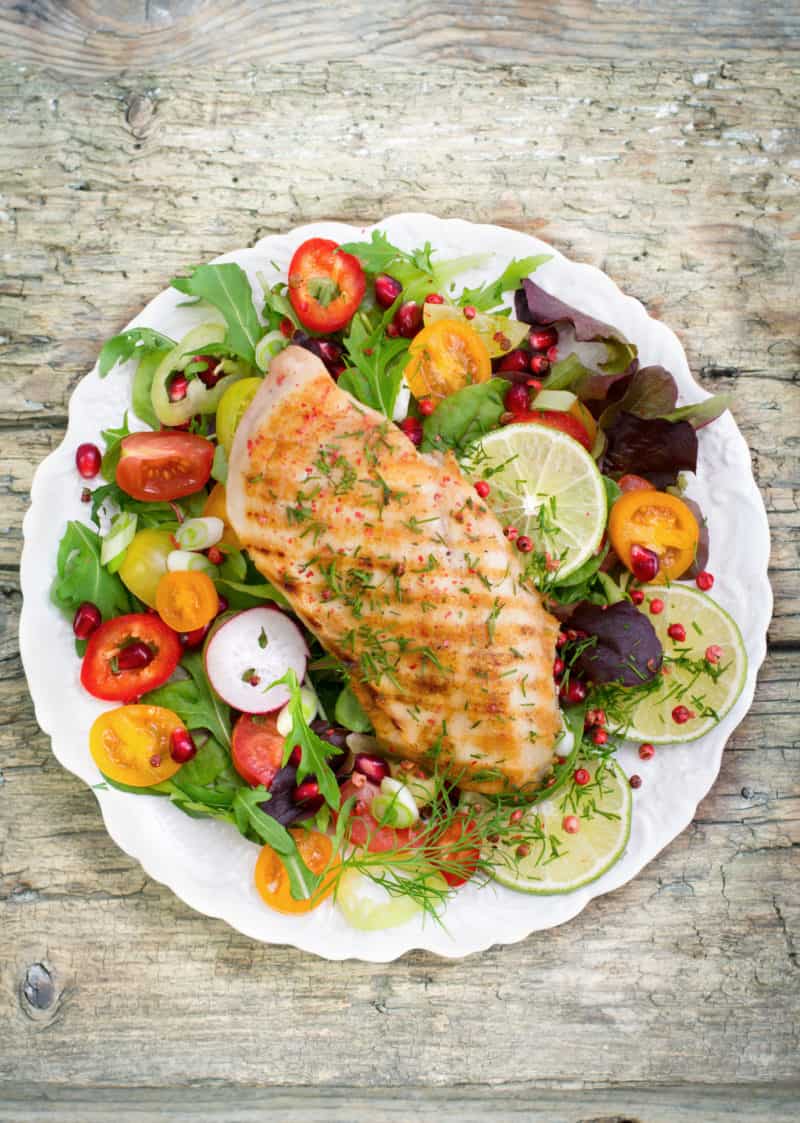Last Updated on April 9, 2021 by Ellen Christian
For as long as I remember, my father has had problems with his stomach. Back when they first started, the doctors had no idea what the problem was. Eventually, he realized that what he had was irritable bowel syndrom. Having IBS can be frustrating, and trying to figure out what to do to make your symptoms better can be incredibly confusing. Even if you figure out what you need to change, sticking with those changes can be extremely difficult. Thank you to HealthyCare.me for sponsoring this conversation today.
Posts may be sponsored. This post contains affiliate links, which means I will make a commission at no extra cost to you should you click through and make a purchase. As an Amazon Associate I earn from qualifying purchases.
5 Food Based Tips to Treat IBS Symptoms
Pam Vagnieres MNT, CSCS has agreed to a few fairly simple dietary changes that have been shown1 to help as many as 50 percent of people with IBS feel better. These recommendations are in addition to, or may be part of, any specialized diets you may try, like Low-FODMAPS.
Pay Attention to Specific Foods
- Spicy Foods – Some people with IBS find spicy foods make their symptoms worse. Several studies have shown chiles and pepper in particular may be related to IBS symptoms, especially when eaten frequently. Garlic and onions may irritate IBS symptoms for others. If you enjoy spicy foods, try eating them is smaller amounts and try to note if certain ones bother you more than others.
- Milk and Dairy – Dairy products may make IBS symptoms worse. It’s not uncommon for lactose intolerance symptoms to overlap with IBS symptoms. Consider trying to decrease dairy, or take it out of your diet completely for 3-4 weeks, to see if your symptoms improve. You might also consider trying lactase, an over-the-counter enzyme supplement that helps digest lactose.
- Fatty Foods – Lard, vegetable oils, butter, nuts, coconuts, seeds, chocolate, cheese, oily fish and avocado may make IBS symptoms worse. Some fatty foods contain healthy fats (e.g.coconut), so we recommend you keep a journal to see if fatty foods play a role in your symptoms and if so, which ones.
Try Reducing Alcohol and Caffeine
- Caffeine – Caffeine can worsen anxiety and make quality sleep more difficult, which may worsen your IBS symptoms. Try cutting down the amount of caffeine you consume each day.
- Alcohol – Drinks containing alcohol worsen IBS symptoms in some people. Try decreasing or stopping use to see if this is the case for you.
Stay Hydrated
- Staying well hydrated is key for optimal gut functioning. Staying well hydrated can reduce constipation and also avert dehydration if you have IBS-related diarrhea.
- While the amount of fluid each person needs can vary widely based on a person’s size and activity level, a guide for people who are not exercising and living in “comfortable” temperature environments is 2.6 quarts for men and 1.7 quarts for women daily.
Be Aware of Eating Habits
- How you eat and where you eat is important for managing IBS. Eating too quickly, too much, or in a stressful environment can all worsen your symptoms.
- Chew your food well and try to eat more slowly.
- Try eating smaller meals, but more frequently through the day.
- Try not to eat at least two hours before bed.
- Try to eat “mindfully.”
- Avoid extremes of temperature for your foods and drinks. For example, try not to drink very cold or hot beverages.
Consider Different Fibers
- Avoid bran fibers – these have not been shown to help IBS symptoms and may even worsen IBS symptoms in some people.
- Psyllium has been shown to help ease symptoms of IBS, for those with or without constipation.
- Foods rich in fiber, as long as they don’t irritate your gut, are also recommended. Some examples of healthy high fiber foods include lentils, split peas, peas, artichokes, beans, leafy green vegetables, avocados, pears and brussel sprouts.
I hope these dietary recommendations give you some ways to start addressing your IBS symptoms. Keep in mind though, that to see the most improvement in your symptoms, dietary changes are just one part of a comprehensive, multidisciplinary approach to treating IBS. Over the next few weeks I will be sharing more information about how to treat your IBS symptoms with exercise, supplements, meditation and better relationships.
Ready to try a multi-disciplinary health program designed specifically for IBS? HealthyCare’s IBS Digital Health Program includes Nutrition/Diet, Mind/Body, Exercise/Movement, and Environmental therapies and practices, along with a community forums where your questions are answered by a MD-led, integrative healthcare team.
To learn more, and to sign up for your free trial of the IBS Program, please visit: Healthycare.me. Learn more about managing irritable bowel syndrome.
AUTHOR: Pam Vagnieres MNT, CSCS
1Gastroenterology. 2015 Nov;149(6):1399-1407.e2. doi: 10.1053/j.gastro.2015.07.054.

Ellen is a busy mom of a 24-year-old son and 29-year-old daughter. She owns six blogs and is addicted to social media. She believes that it doesn’t have to be difficult to lead a healthy life. She shares simple healthy living tips to show busy women how to lead fulfilling lives. If you’d like to work together, email info@confessionsofanover-workedmom.com to chat.


10 thoughts on “5 Food Based Tips to Treat IBS Symptoms”